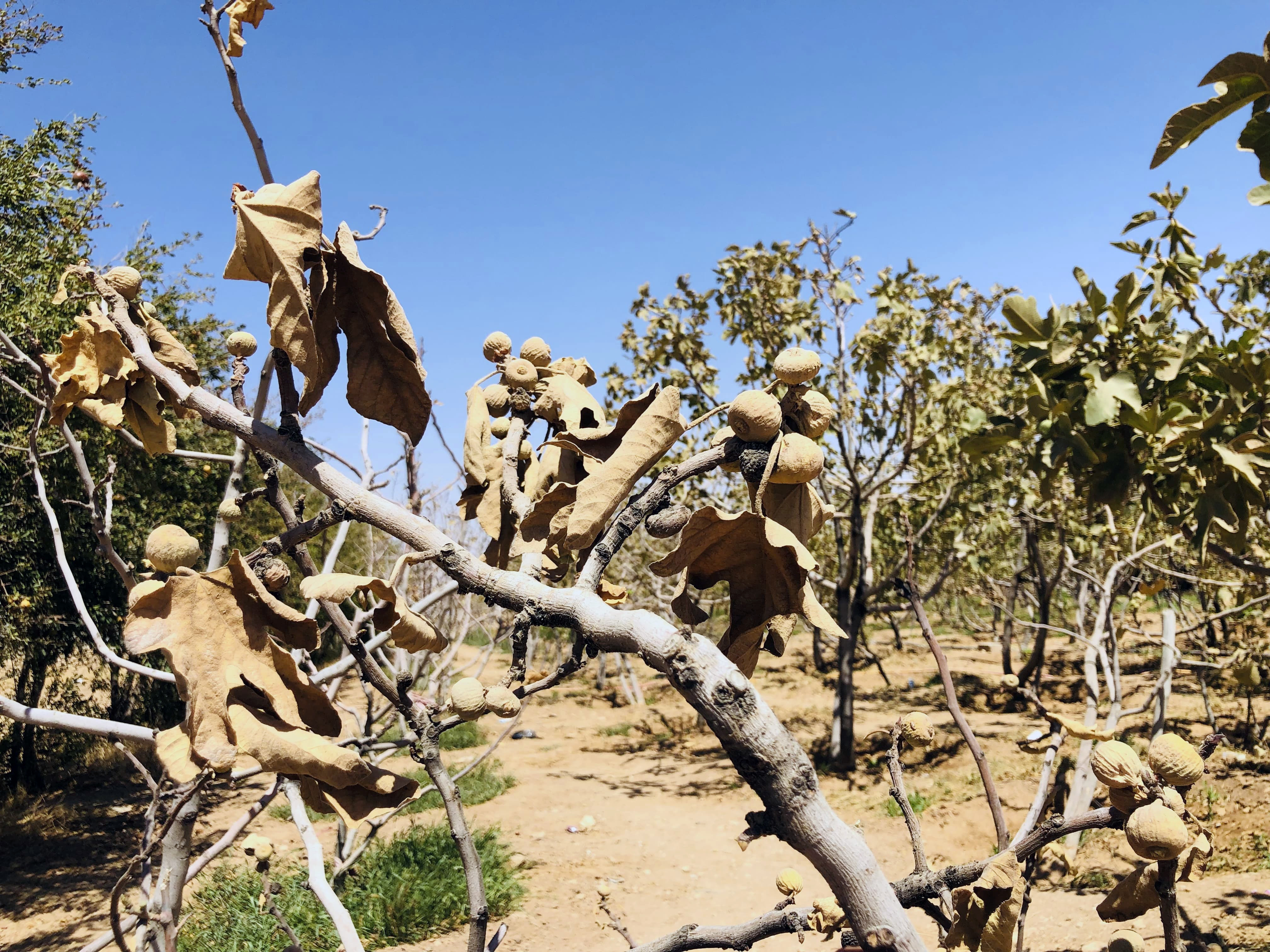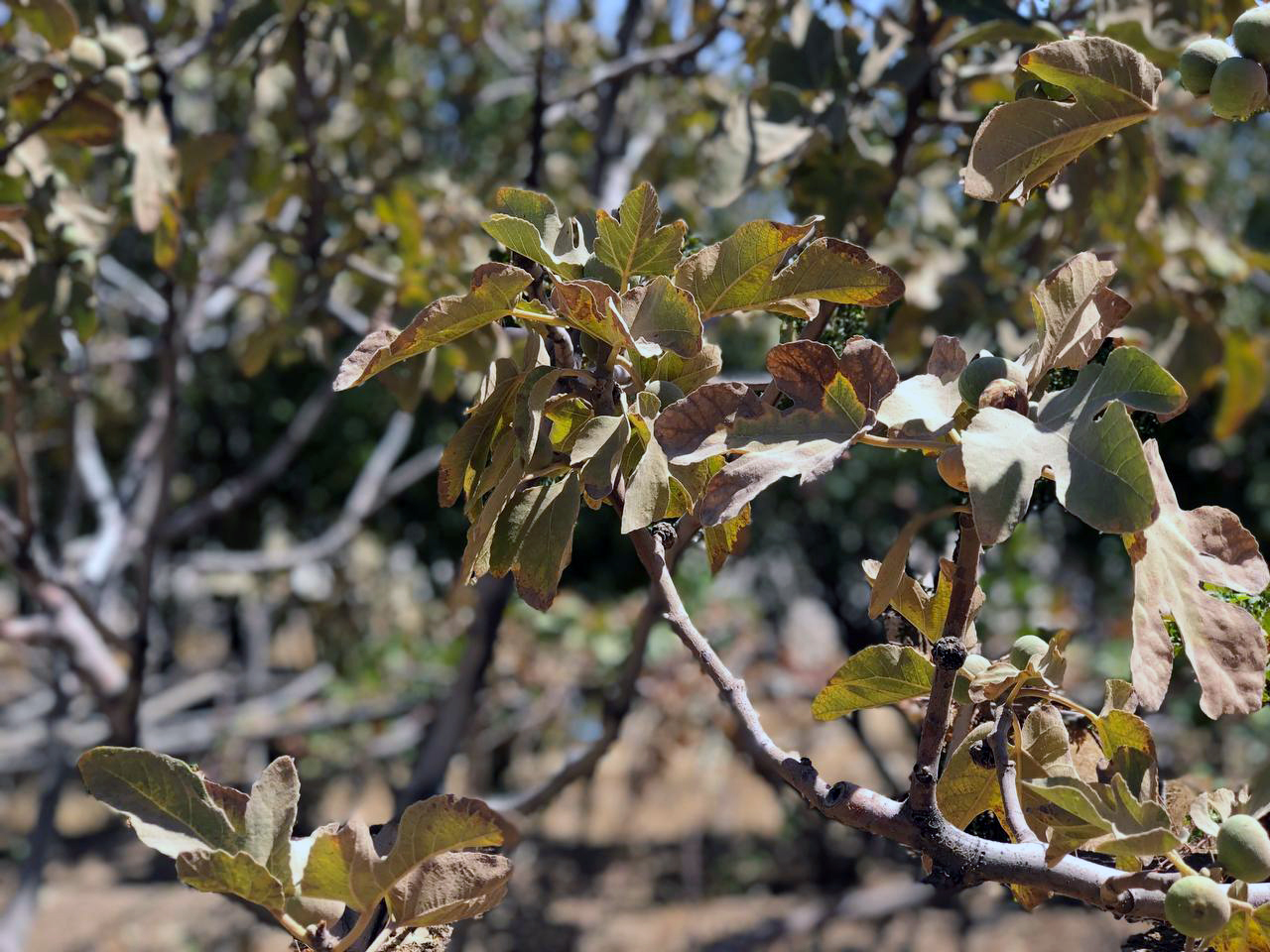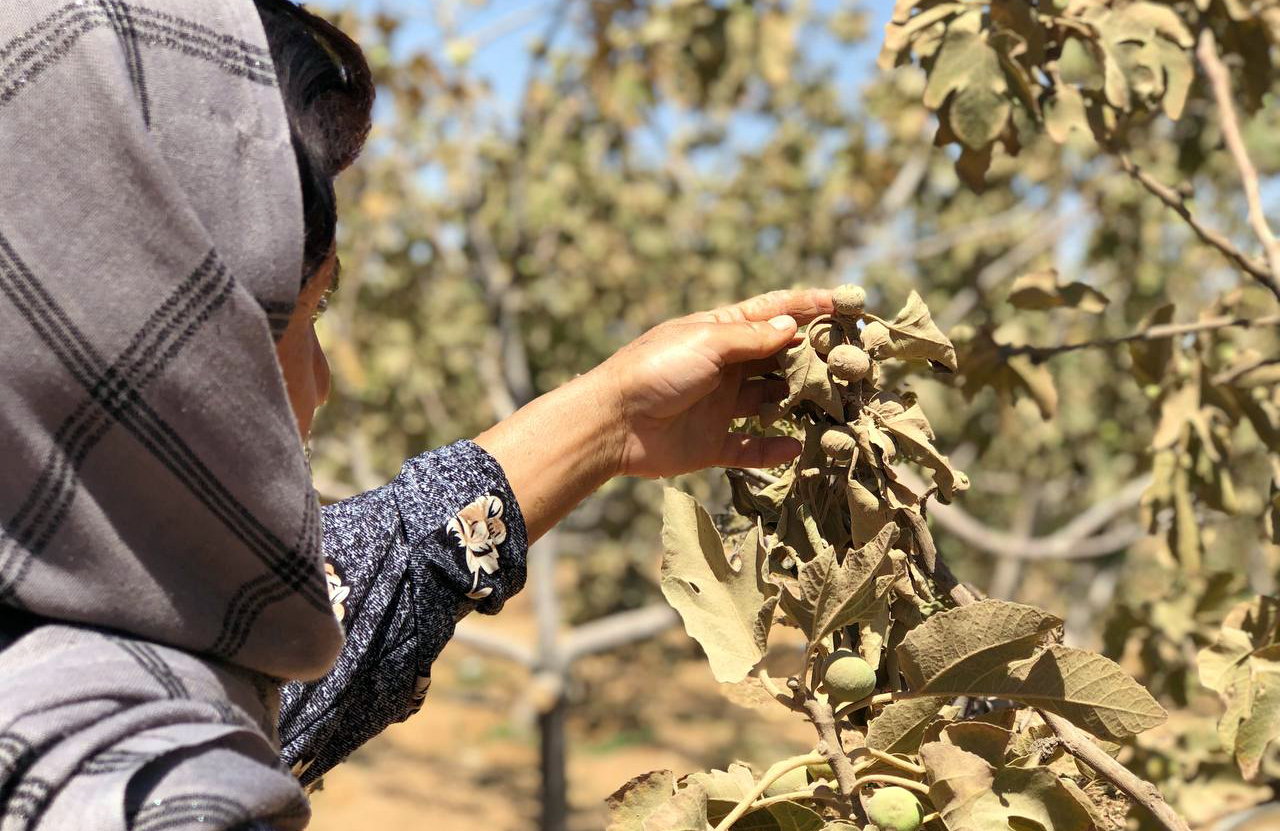"The fig leaves that were once soft and shiny have now become dry and brittle. The joyful sound of ripe figs falling to the ground, filling the air with happiness, is no longer heard. Instead, a deadly silence has taken over," says Shireen Qari, as she recounts the story of her village in Shingal.
Shireen hails from the village of Karsi, nestled in the heart of Mount Shingal, where the once fertile land used to yield abundantly, teeming with figs and tobacco as far as the eye could see. However, it has transformed from an agricultural paradise into barren terrain, plagued by the impacts of climate change due to water scarcity and drought.
Shireen (54 years old), a mother of four, has been cultivating figs for decades on land passed down from her ancestors. After her husband's passing in 2016, she took on the responsibility of tending to 250 fig trees, yielding between 7 and 8 tons annually, along with growing various vegetables. Now, she faces unprecedented challenges.
“Everything was different back then. We would wake up at dawn and toil together in the fields, nurturing the figs and other trees. We relied on the land for everything. It was our life and our livelihood.”
The Karsi area, situated 37 km northeast of Shingal, is one of the most picturesque natural regions. Through the ages, its inhabitants have depended on agriculture as their primary source of income, cultivating a variety of crops, from figs and tobacco to pomegranates, olives, and vegetables.
In recent years, rainfall has dwindled, and the land has parched, resulting in crop failures. In 2020, Shireen's life was upended as she witnessed the fig trees wither and perish. With little government aid and rising temperatures, the land could no longer provide.
We watched the land wither and were left with no choice but to depart
“The rain ceased as it used to, and the land slowly dried up, causing crops to wither,” describes Shireen, recounting the changes that forced farmers to abandon their lands and migrate to cities in search of alternative employment.
“We were not alone in this; approximately 130 families left to escape drought, poverty, and the loss of everything they had worked for. We watched the land wither and were left with no choice but to depart.”
Shingal District, west of Nineveh Province, is renowned for producing top-quality figs in Iraq, in addition to grapes, honey, tobacco, and other crops.
Ali Elias, an agricultural engineer and environmental activist, explains that all was well until 2019, but since 2020, the soil began to desiccate due to diminishing groundwater in the artesian wells that once irrigated the crops annually, coupled with rising temperatures.
"The water levels have drastically decreased, attributed to the lack of dams to retain rainwater, along with excessive well digging, disregarding the consequences of depleting groundwater," he elaborates.
Figs typically ripen from late July until late October, with the ideal temperature for ripening ranging between 29 and 38 degrees Celsius. However, temperatures this year exceeded 40 degrees.
“For five years, I have not tasted the fruits of my labor. The soil has become infertile, refusing to yield, despite the substantial investment I've made in my land,” laments Qasim Khedida Ashour, another farmer from the village of Hangara.
“I've poured nearly ten million (USD7,000) into my land to sustain my family and stave off hunger. I've invested all my savings, hoping my land would be fruitful as it once was, but it forced us to abandon it.”

Fig crop wilts in the village of Karsi in Shingal district due to water scarcity and high temperatures, Nineveh, Summer 2024. Mariam Younis
According to unofficial figures from the Shingal Agriculture Division, around 4,000 fig trees withered or bore fruitless during 2023.
Barakat Issa, Director of Agriculture in the Northern District - Sinuny, informed (KirkukNow), "Fig production has declined by 50% due to insufficient government support, as individual efforts are insufficient to restore production to previous levels."
He noted that mountainous regions in Shingal, like Gabara, Givri Hungara, Dereji, and Karsi, house about 15,000 fig trees planted by the locals.
According to the statistics of the Shingal Agriculture Office, there are 50,000 trees in the district, leave alone thousands of other trees destroyed by the fighting between the Islamic State of Iraq and the Levant (ISIL) and Iraqi Security Forces ISF.
In 2021, fig production in Sinuny sub-district of Shingal amounted to only 75 tons from 150,000 fig trees, a stark contrast to the 150 tons produced in 2019.
Issa emphasizes that this significant drop in the fig crop reflects the adverse effects of climate change.
Fig production has declined by 50% due to insufficient government support
"The emissions from the Shingal Cement Factory directly contribute to climate change, impacting the primary source of income for many families."
As per United Nations UN data and warnings, Iraq ranks fifth among countries most affected by climate change repercussions, encompassing water scarcity, drought, rising temperatures, pollution, and other natural calamities.
Shireen characterizes the changes on her land as the beginning of the end, stating, “We tried our best to shield our trees from drought, but it was beyond us. Season after season, we witnessed crop failures, as if the earth was punishing us for reasons unknown.”
Over time, she found it untenable to carry on in the village. "There was nothing to cultivate, nothing to subsist on, everything we had built crumbled before our eyes."
Thus, she opted to leave the land she was deeply connected to and relocate with her children to the Khanasour complex in the northern district of Shingal.
The repercussions of climate change are compelling people to vacate their areas; over 20,000 individuals in Iraq have been displaced or perished due to drought, according to the United Nations.
"Our village is renowned for figs, grapes, and pomegranates, yet it has grappled with water scarcity for years. We've endeavored to tackle this issue independently, but regrettably, we've fallen short," shared Turko Murad, 45, from the village of Tarif.
He stressed the need to drill artesian wells to maintain their trees, numbering over 7,000 fruit trees. "This is beyond our means, as a single artesian well costs approximately 10 million. If the water issue remains unresolved, we'll be compelled to abandon our lands."
The Shingal fig crop, prized for its distinctive taste and hue, is retailed in Mosul and Dohuk markets. The cost per kilogram ranges from 3,000 to 5,000 Iraqi dinars IQD (USD2-3), contingent on quality and ripeness.
“In the 1970s and 1980s, tobacco plantations dominated the landscape, resonating with the voices of farmers tending to their crops. Life revolved around agriculture,” reminisces farmer Ziad Hassan, from the village of Karsi, recalling a time when his land was lush.
“The farmers were the heartbeat of life.”
Hassan gestures to an ancient well on his property, once brimming with water to quench both people and plants. “Now, our land has transformed into semi-desert, unfit for cultivation,” he remarks. “This dealt a severe blow to all of us.”
Nineveh Province stands as Iraq's second-largest fig producer after Salahaddin, boasting an annual yield exceeding 2,500 tons, as per the latest Statistical Center report for Summer Fruits 2021.
A number of young volunteers, mostly girls, want to revive the dead fruits of figs and olives, the two precious trees that due to war and security instability, are completely destruction. About 50 young volunteers were working with hope as part of a long-term project to plant one million trees in Sinjar, Nineveh province, to replace the destruction of thousands o trees in the district, a project by the House of Coexistence in Shingal. In total, 8,000 cuttings were cultivated into saplings in a month, 7,000 of which are figs.

Ali Elias notes that climate change in Shingal commenced nearly two decades ago, stemming from various factors like deforestation, cement factory emissions, and war remnants.
Despite the grim outlook, he remains hopeful, citing potential solutions to salvage the remaining agricultural wealth in Shingal.
“The remedy lies in constructing dams to retain rainwater. Rather than awaiting governmental intervention, farmers can take the initiative by allocating a portion of their lands to dig large cavities that function as mini reservoirs, storing rainwater and sustaining them for an entire agricultural season.”
According to the statistics of each of the Agriculture Division in Shingal and Sinuny, there are 50,000 fig trees in Shingal district, 40,000 located within the boundaries of Sinuny but these statistics do not include all orchards, because agriculture officials say that there is a large number that has not been registered yet.
Shingal is home to more than 40,000 hectares of agricultural land and most of that area relies on rainwater, while the amount of rainfall in Iraq has decreased significantly for the last two years as water scarcity has become a challenge for several countries due to climate change.
Issa attributes the fig tree desiccation to several factors, including “some farmers neglecting their orchards due to resource constraints or lack of motivation, while others are unable to tend to their trees due to the deteriorating security situation in their areas.”
Shingal district, a disputed territory between the Iraqi federal government and the Kurdistan Regional Government, predominantly inhabited by the non-Muslim Ezidi (Yazidi) community, continues to grapple with administrative challenges, where different armed groups are deployed and facing sporadic shelling from Turkey under the guise of pursuing Kurdistan Workers’ Party PKK fighters.
Leaving the village proved no easy feat for Shireen, “That land was our everything, connecting us to our heritage and instilling a sense of belonging. Departing wasn't just leaving home; it was abandoning an entire life.”
Shireen's narrative encapsulates sorrow and yearning, yet it also embodies hope and resolve to persevere. Residing in Khansoor, she clings to the dream of returning, “Longing for the land never dissipates. Though we dwell in Khansoor, our hearts still reside in Karsi, with the trees, the figs, and the memories.”





